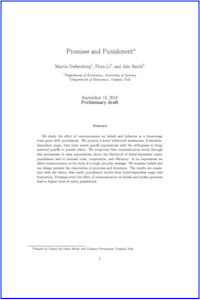By Martin Dufwenberg , Flora Li , and Alec Smith
We study the effect of communication on beliefs and behavior in a three-stage trust game with punishment. We propose a novel behavioral mechanism, frustrationdependent anger, that links unmet payoff expectations with the willingness to forgo material payoffs to punish others. We conjecture that communication works through this mechanism to raise expectations about the likelihood of belief-dependent costly punishment and to increase trust, cooperation, and efficiency. In an experiment we allow communication in the form of a single pre-play message. We measure beliefs and our design permits the observation of promises and deception. The results are consistent with the theory that costly punishment results from belief-dependent anger and frustration. Promises drive the effect of communication on beliefs and broken promises lead to higher rates of costly punishment.
Preliminary draft. September 13, 2018



